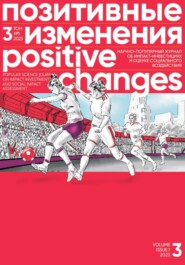 Полная версия
Полная версияПозитивные изменения, Том 3 №1, 2023. Positive changes. Volume 3, Issue 1 (2023)
Winner of the Foundation for Assistance to Small Innovative Enterprises (FASIE) “Start-1” competition (2022).
FUNDS RAISED IN 2022• A grant of 1.2 million rubles received from the “Reach for Change” Foundation.
• 300,000 rubles raised in donations.
• A grant of 4 million rubles from the FASIE.
WHAT WAS DONE LAST YEAR• “Stop-Hemangioma” mobile app developed;
• a web version of the application tested;
• a Rospatent certificate of state registration of a software program obtained;
• response received from Roszdravnadzor’s All-Russian Medical Technology Research and Testing Institute for (VNIIIMT) concerning registration of the mobile app.
DIRECT RESULTS FOR 2022• Android mobile application published in Play Market, NashStore, RuStore;
• Observation diaries for various hemangioma types developed;
• The rules of photographic evidence collection developed;
• Application tested at St. Vladimir Children’s City Clinical Hospital and Children’s City Polyclinic No. 125 of the Moscow City Health Department;
• Doctors involved in the Stop-Hemangioma project became members of the Russian Association of Pediatric Surgeons and the Russian Society for the Study of Vascular Anomalies.
SOCIAL EFFECTS ACHIEVED IN 2022• 98 % satisfaction with the remote monitoring system among project participants;
• Increased parents’ awareness of hemangioma care, monitoring and treatment, including through access to proven medical literature via the mobile app;
• 130 children with hemangiomas monitored remotely;
• Personal appointments for children were reduced from 4 to 1 per month.
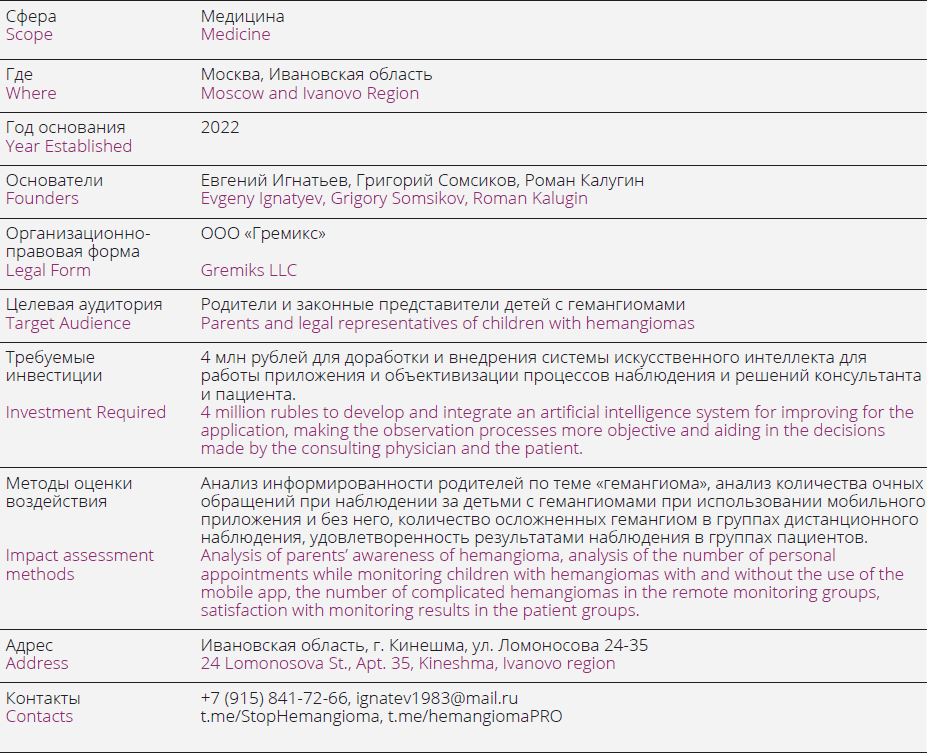
Lack of neglected cases in the remote monitoring group, increased patient satisfaction in the remote monitoring group.
FINANCIAL SUSTAINABILITY MODELThe project is currently being implemented with the help of a grant from the “Reach for Change” Foundation and the Foundation for Assistance to Small Innovative Enterprises. The project authors plan to start selling the mobile app via the marketplaces in the future. In addition, the application will include two paid subscription options – short-term monitoring (1 month, 1,000 rubles), and long-term (6 months, 5,000 rubles).
In January 2023, the authors of the project opened Gremiks LLC. The company will be engaged in scientific research in the problem field and developing artificial intelligence algorithms for integration into the mobile application.
INLIFEGeneral Developmental Programs of Physical Education and Sports Orientation for Children with Disabilities.
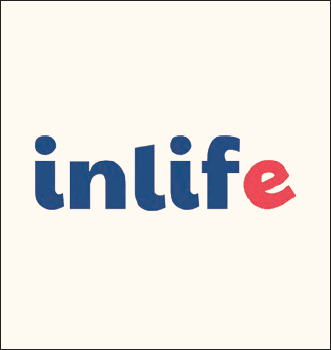

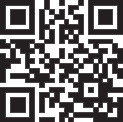
http://inlife.care
INLIFE Adaptive Sports Center is a project that teaches adaptive sports, including figure skating, to children with special needs.
PROBLEM ADDRESSEDNumerous studies have proven that physical education and sports are the most important methods of successful socialization, rehabilitation and adaptation to adult life in children and adolescents with disabilities. However, not all regions of the Russian Federation allow children with disabilities to attend sports sections or therapeutic physical education classes. The reasons are varied: from lack of specialists and infrastructure and low financial status of the parents of children with disabilities, to insufficient awareness among parents about the possibility of receiving habilitation assistance. A survey of parents, conducted by the INLIFE Adaptive Sports Center, showed that 95.7 % address the problem of their child’s rehabilitation on their own. At the same time, 100 % of parents are interested in receiving assistance from the state.
The INLIFE project is designed to create conditions for children with mental disabilities, autism spectrum disorders (ASD), attention deficit hyperactivity disorder (ADHD), delayed mental and speech development (DMSD), hearing-impaired children and children with a mild form of cerebral palsy to practice adaptive sports.

INLIFE Adaptive Sports Center started in 2019 with figure skating training for children with mental disabilities. Two branches opened in Moscow region later; during the pandemic, the center was forced to go online. The Center founder is Zhanna Soroka, Master of Sports of the Soviet Union in figure skating and a member of the Moscow Figure Skating Federation.
INLIFE Adaptive Sports Center sees its mission in improving the quality of life for children with disabilities through adaptive sports. To achieve this goal, the organization pays special attention to the following:
• the program participants’ results;
• continuous personnel training and professional development.
The center’s specialists have developed their own methodology for training coaches and tutors, called “Specifics of Interaction Between a Figure Skating Coach and a Support Specialist (Tutor) in the Process of Teaching Children with Mental Disabilities.” The program is designed for 72 academic hours. In June 2019, the methodology developed received a positive review from the Expert Committee of the Inter-Institution Council of the Russian State University of Physical Education, Sports, Youth and Tourism, and was recommended for publication and use in the educational process. In 2020/2021 the course was included in the professional development programs of the Russian University of Sports (SCOLIPE).
Currently, offline classes are held at two branch offices of the Center: SPEC Salute in Dolgoprudny, and Vladimir Petrov Arena in Krasnogorsk. Regular children and children with mental disabilities ages 4 to 18 can attend the figure skating and general physical education classes. A tutor accompanies them during training sessions. An individual learning trajectory is developed for each child for group sessions. Children and parents also have the opportunity to receive psychological counseling on a regular basis.
The Adaptive Sports Center services are also available online, on a special platform that allows organizing the learning process. The platform includes:
• A syllabus;
• All theoretical materials required;
• Videos of the suggested exercises;
• Video conferencing for online classes;
• Feedback from the coach and the psychologist;
• Learning progress tracking;
• An incentives program for students.
ACCOMPLISHMENTS AND AWARDSWinner of the 2019 “Mama Entrepreneur” Program in Moscow Region.
Finalist of the 2021 “Towards Impact Startups” competition by the “Reach for Change” Foundation.
Grantee of the Vladimir Potanin Foundation in 2023. The “Figure Skating for All” professional development program (extended adaptive figure skating practices in Moscow and the Moscow region) was one of the laureates of the “Sports Platoon” competition, part of the “Power of Sports” charity program.
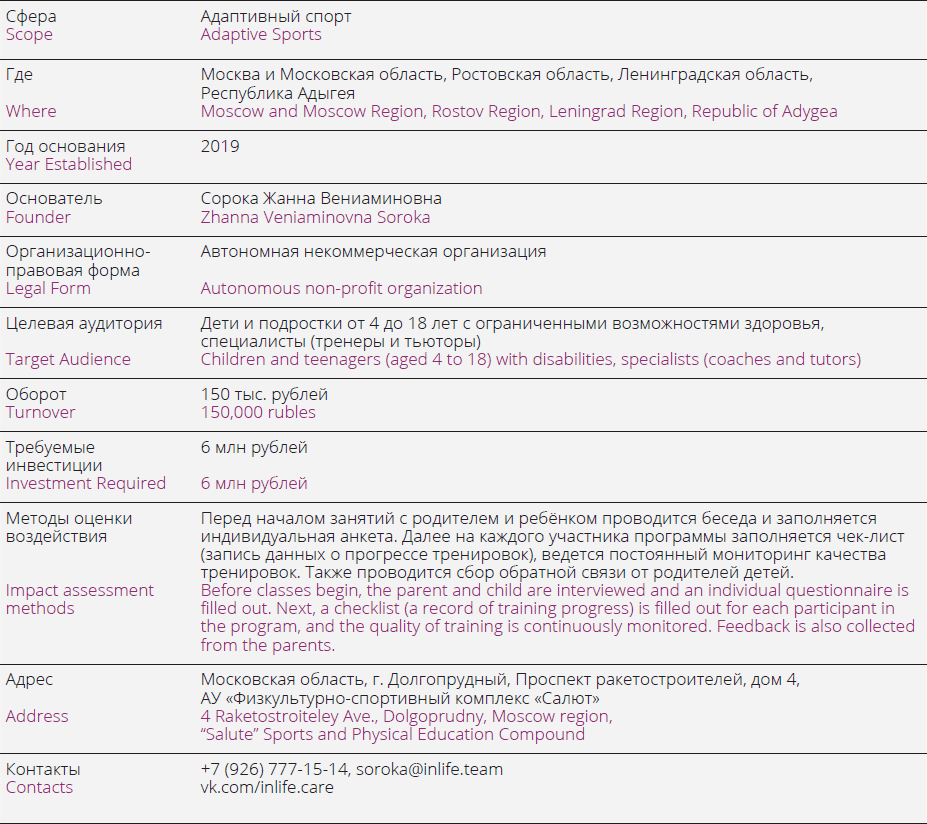
• Private donations – about 70,000 rubles total;
• Parents’ subscription fees – about 50,000 rubles;
• Voluntary contribution for statutory activities – 30,000 rubles.
WHAT WAS DONE LAST YEAR• Individual skating lessons for children with various diseases – more than 100 hours;
• Full-time adaptive physical education classes – more than 35 hours;
• Online classes in adaptive physical education and adaptive volleyball – more than 70 hours;
• Active work on raising grant support for the center.
DIRECT RESULTS FOR 2022Fifteen children with mental disabilities aged 5 to 18 completed personal and remote training.
SOCIAL EFFECTS ACHIEVED IN 2022The following social impact assessment indicators were used:
• The percentage of children in the group with decreased incidence of acute respiratory infections;
• Indicators demonstrating the individual success of children in the group (endurance and motor coordination activity);
• The percentage of children involved in classes. After three to six months of regular exercise, the center’s specialists noted:
1. The incidence of acute respiratory viral infections decreased by more than 30 % among the children in the group.
2. The children can do 8–10 squats and push-ups without interruption (1–3 times without interruption before the training).
3. The children have learned how to interact with teachers and other students. Previously, they were distracted by each other, did not repeat exercises after the trainer, did not listen to the attendant.
4. The children can attend physical education classes at school or in inclusive sports sections. Prior to the start of the training, group classes in school or sports sections had little effect. Classes at the center helped focus the students’ attention and set up a dialogue with teachers and tutors, develop rules of conduct and discipline.
SOCIAL AND ECONOMIC IMPACTImproving the quality of life and health for children with mental disabilities.
FINANCIAL SUSTAINABILITY MODEL• Parents’ subscription fees for tuition;
• Grant support;
• CSR (partnerships with companies);
• Public-private partnership;
• Support from the municipal budget;
• Support from the federal budget;
• Private charitable contributions.
Ob ForgeCultural and Educational Activities in the Creative Industries.
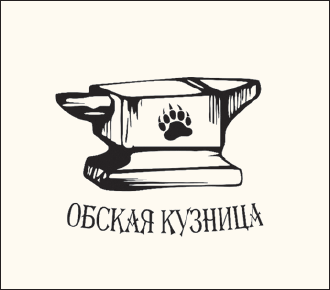
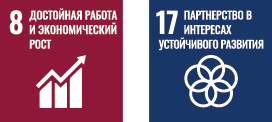
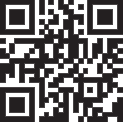
obskayakuznica.com
The “Ob Forge” project unites artisans and craftsmen producing souvenir products from metal. Since August 2022, it became a part of the “FORGE” Creative Industries Agency, which promotes local brands in and beyond Yugra.
PROBLEM ADDRESSEDPreserving local knowledge, skills and craftsmanship, raising awareness of the history and culture of the northern peoples of Khanty and Mansi, as well as the contemporary Yugra.
METHODS USED TO ADDRESS THE PROBLEMThe forge brings together various metal, wood, leather and bone workers. The project authors are doing research on the development of blacksmithing in the former Tobolsk Governorate. University and college students can come here for internships. People with disabilities are also welcome.
“We are constantly experimenting, working with blueprints and custom sketches, doing historical reconstructions. It is hard to put us in one line of business – we are a little bit about tourism, a little bit about recreation and education, even near industry. Each product is created with love and respect for people, our national traditions and natural resources,” project founder Ekaterina Tailakova says.
Ob Forge offers group tours, as well as workshops on making wrought-iron souvenir products (from nails to knives). The workshops are preceded by a lecture on the history of metalworking and the development of blacksmithing. Participants are introduced to the exhibits of the private Museum of Wrought-Iron Products and can examine, try on and photograph parts of reconstructed historic Spanish knight armor from the 15th-16th centuries.
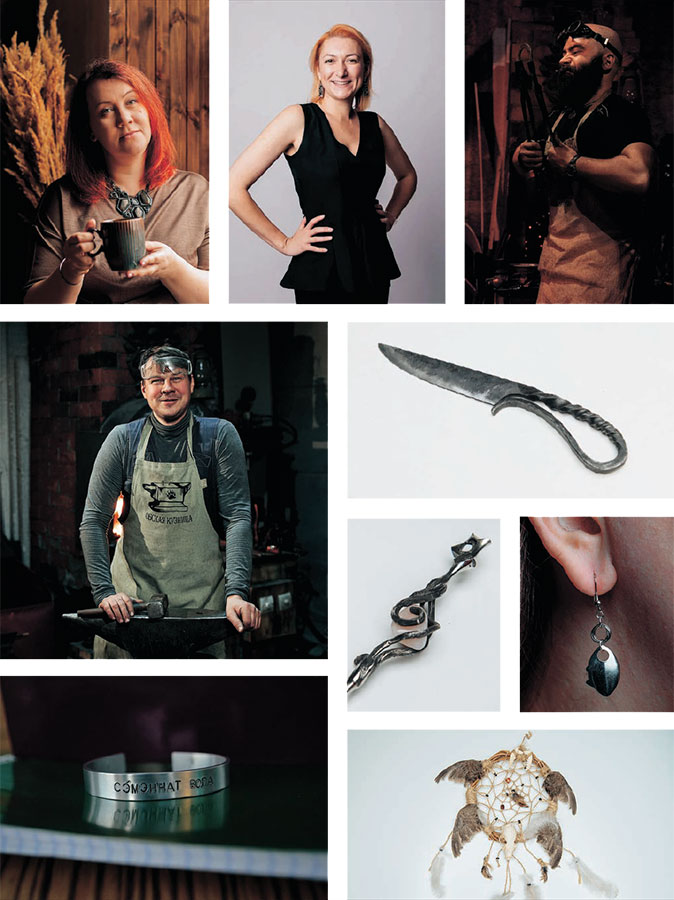
Wrought-iron products can be purchased online through social networks and websites, in souvenir stores in different cities of Khanty-Mansi Autonomous Okrug – Yugra and Yamalo-Nenets Autonomous Okrug, as well as in various marketplaces in Russia and abroad.
In 2022, Ekaterina Tailakova and Anastasia Bondarenko designed a unisex aluminum jewelry collection with embossed words and expressions of the Khanty and Mansi languages. The project was supported by the staff of the A. P. Yadroshnikov Museum of Nature and Man in Russkinskaya, some of whom speak one of the dialects of the Khanty language.
The following phrases were selected to create the experimental collection, the first of which became the name of the project: “Guarded by Torum”, “Land of Torum”, “Goddess of Fire”, “Live in Peace”, “Warrior”, “Love”, “Friendship”, “Happiness”, “Luck”, “Fortune”, “Yugra – a Place of Power”.
The authors emphasize that the project “Guarded by Torum” has many meanings. “For those who speak Russian, we put transcriptions of words and entire phrases on the outside of the jewelry, with proper accents over them, so that a person can correctly convey the phonetics of the sonorous Khanty and Mansi languages. It is about working with oral heritage. For native speakers, we write the words in the letters of “their” dialects. The alphabets of the Khanty and Mansi peoples have “special” letters that are not part of the Cyrillic alphabet. This is how we work with the written heritage,” they explain.
FUNDS RAISED IN 2022• A grant from the Creative Industries
Accelerator in the amount of 100,000 rubles (in the “Fashion” category), organized by the Yugra Entrepreneurship Support Fund “My Business”, the “Business Environment” platform with support from LUKOIL.
• A grant for social entrepreneurs from the Department of Economy of the Khanty-Mansi Autonomous Okrug – Yugra, in the amount of 500,000 rubles.
• 1.5 million rubles revenue from sales of products and services.
• The largest shopping mall in the district, Surgut City Mall, provided 4 wooden cabins in front of the main entrance to open a souvenir store, two craft workshops and a cultural center for the warm season.
ACCOMPLISHMENTS AND AWARDSIn 2022:
• Laureate of the All-Russian contest “100 Best Goods of Russia” in the nomination “Folk Arts and Crafts Products” (traditional Yakut ice shovel);
• Diploma winner of the contest “The Best Goods and Services of the Tyumen Region” (traditional Yakut ice shovel, Khanty knife);
• Winner of the “Yugra Business Leader” contest in the special nomination “For Contribution to Preservation and Development of Folk Arts and Crafts of Russia”;
• Winner of the contest “The Best Product of Yugra” in the category “National Crafts and Souvenirs”;
• Winner of the “Young Entrepreneur of Yugra” contest in the special category “Creative Business”;
• Diploma of the contest “The Best Social Project of the Year” in the special nomination of the Yugra Public Chamber (“Ob Forge: Expansion” project);
• Winner of the city contest “Entrepreneur of the Year” in the category “Business of Creative Industries” (Surgut, according to the results of 2021).
WHAT WAS DONE LAST YEAR• Started working with the museum heritage – creating replicas of metal products (the Surgut Museum of Local Lore provided the collection to study the material);
• Started working with wax and materials derived from animals;
• Offered workshops on embossing of aluminum bracelets;
• Launched one-hour-long group tours of the forge;
• Presented the “Mobile Forge” and “Mobile Minting” services;
• Increased the number of self-employed people making handicrafts for the project.
DIRECT RESULTS FOR 2022More than 1,000 new visitors and customers. The share of recurring visitors has also increased.
SOCIAL EFFECTS ACHIEVED IN 2022• We conduct career guidance activities, students specializing in metalworking of Surgut Polytechnic College are familiar with us;
• We help craftsmen and artisans formalize self-employment and work legally; we accompany and assist them in obtaining support measures, grants and subsidies for business development;
• We are noticing a growing interest in blacksmithing, with an increasing number of visitors from other cities in neighboring regions and federal districts;
• We advise members of the Blacksmiths Guild of Russia on how to conduct their business competently and build stronger relationships with the authorities.
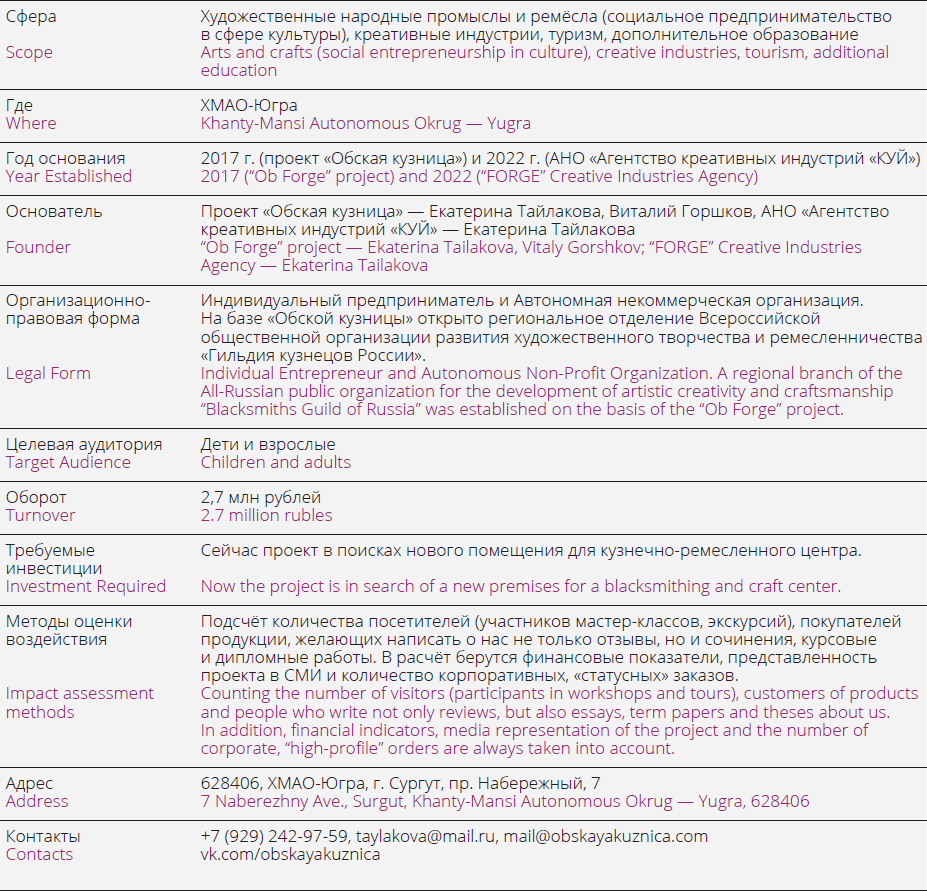
Workshops on blacksmithing have always been our core activity. During the pandemic, we shifted profile to producing medium-sized wrought-iron interior decoration items for suburban houses. Our products are sold on the Asian online marketplace, pinkoi.com, previously worked with etsy.com.
On August 17, 2022, we opened the “FORGE” Creative Industries Agency (autonomous non-profit organization) to be able to receive grant support. In addition, we monitor available measures of state support in the Khanty-Mansi Autonomous Okrug – Yugra (subsidies, reimbursements of costs, grants for entrepreneurs).
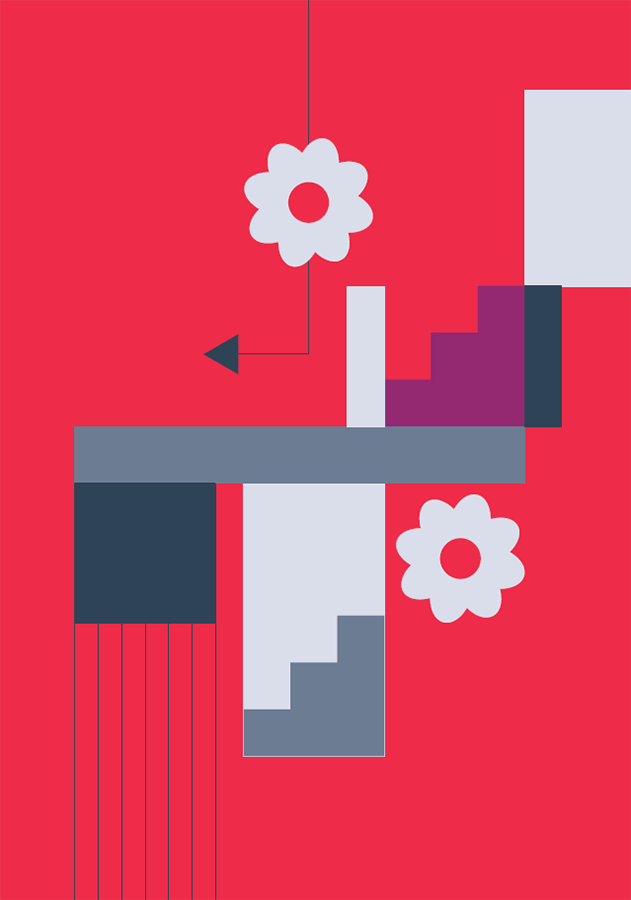
Примечания
1
Здесь и далее под оценкой понимается «систематический сбор информации о деятельности в рамках программы, ее характеристиках и результатах, который проводится для того, чтобы вынести суждение о программе, повысить эффективность программы и/или разработать планы на будущее». Источник: Patton, M. Q. (2008). Utilization-focused evaluation (4th ed.). Thousand Oaks: Sage Publications.
2
Wikipedia. (2022). Michael Quinn Patton. Retrieved from: https://en.wikipedia.org/wiki/Michael_Quinn_Patton.
3
Здесь и далее под оценщиком понимается специалист по оценке.
4
The Blue Marble – фотография планеты Земля, сделанная 7 декабря 1972 года экипажем космического корабля «Аполлон-17» с расстояния примерно в 29 тыс. км от поверхности Земли. Для астронавтов Земля имела размер и вид голубого марбла (игрушки, обычно представляющей собой цветной стеклянный шарик).
5
Hereinafter, evaluation is understood as “the systematic collection of information about the activities, characteristics, and outcomes of programs to make judgments about the program, improve program effectiveness, and/or inform decisions about future programming.” Source: Patton, M. Q. (2008). Utilization-focused evaluation (4th ed.). Thousand Oaks: Sage Publications.
6
Wikipedia. (2022). Michael Quinn Patton. Retrieved from: https://en.wikipedia.org/wiki/Michael_Quinn_Patton.
7
Hereinafter, an evaluator is defined as an evaluation specialist.
8
The Blue Marble is a photograph of Planet Earth taken on December 7, 1972 by the crew of Apollo 17 spacecraft from a distance of around 29,000 kilometers from the planet’s surface. For the astronauts, Earth was the size and appearance of a blue marble (a colored glass ball toy).
9
Wilensky, L. (1964). The professionalization of everyone? American Journal of Sociology, 70(2), 137–158. Ayoo, S., Wilcox, Y., LaVelle, J. M., Podems, D., & Barrington, G. V. (2020). Grounding the 2018 AEA Evaluator Competencies in the broader context of professionalization. In J. A King (Ed.), The American Evaluation Association’s Program Evaluator Competencies. New Directions for Evaluation, 2020, 13 30.
10
Heider, C. Professionalizing Evaluation. 28.04.2015. The World Bank Group. Retrieved from: https://ieg.worldbankgroup.org/blog/professionalizing evaluation. (accessed 01.03.2023).
11
АСОПП. (2017). Принципы оценки программ и политик АСОПП. Режим доступа: https://www.eval.ru/principles_of_evaluation. (дата доступа: 01.03.2023).
12
Canadian Evaluation Society. (2023). Evaluator Competencies. Retrieved from: https://evaluationcanada.ca/career/evaluator-competencies.html. (accessed 01.03.2023).
13
Гарант. ру. (2013) Постановление Правительства РФ от 22 января 2013 г. № 23 «О Правилах разработки, утверждения и применения профессиональных стандартов». Режим доступа: https://www.garant.ru/products/ipo/prime/doc/70204190/. (дата доступа: 01.03.2023).
14
Schwandt, T. A. (2017). Professionalization, Ethics, and Fidelity to an Evaluation Ethos. American Journal of Evaluation, 38(4), 546 553. https://doi.org/10.1177/1098214017728578.
15
Wilensky, L. (1964). The professionalization of everyone? American Journal of Sociology, 70(2), 137–158. Ayoo, S., Wilcox, Y., LaVelle, J. M., Podems, D., & Barrington, G. V. (2020). Grounding the 2018 AEA Evaluator Competencies in the broader context of professionalization. In J. A King (Ed.), The American Evaluation Association’s Program Evaluator Competencies. New Directions for Evaluation, 2020, 13 30.
16
Heider, C. Professionalizing Evaluation. 28.04.2015. The World Bank Group. Retrieved from: https://ieg.worldbankgroup.org/blog/professionalizing evaluation. (accessed 01.03.2023).
17
ASPPE. (2017). ASPPE Principles of Program and Policy Evaluation. Retrieved from: https://www.eval.ru/principles_of_evaluation. (accessed: 01.03.2023).
18
Canadian Evaluation Society. (2023). Evaluator Competencies. Retrieved from: https://evaluationcanada.ca/career/evaluator-competencies.html. (accessed 01.03.2023).
19
Garant.ru. (2013) Decree No.23 of the Government of the Russian Federation dated January 22, 2013 “On the Rules for the Development, Approval and Application of Professional Standards”. Retrieved from: https://www.garant.ru/products/ipo/prime/ doc/70204190/. (accessed: 01.03.2023).
20
Schwandt, T. A. (2017). Professionalization, Ethics, and Fidelity to an Evaluation Ethos. American Journal of Evaluation, 38(4), 546 553. https://doi.org/10.1177/1098214017728578.
21
С полным текстом актуализированной Позиции можно ознакомиться здесь: https://www.donorsforum.ru/reports/forum-donorov-obnovil-pozitsiyu-assotsiatsii-porazvitiyu-kultury-otsenki/.
22
The full text of the updated Policy Statement can be found here: https://www.donorsforum. ru/reports/forum-donorov-obnovil-pozitsiyu-assotsiatsii-po-razvitiyu-kultury-otsenki/.
23
Издание Американской ассоциации оценки.
24
Ассоциация специалистов по оценке программ и политик. (2023). Режим доступа: www.eval.ru. (дата доступа: 14.02.2023).
25
Создатели Альянса – Архангельский Центр социальных технологий «Гарант», компания «Процесс Консалтинг» (Москва) и Сибирский Центр поддержки общественных инициатив (Новосибирск).
26
Альянс #PROОЦЕНКУ. (2022). Режим доступа: http://www.proocenku.club/. (дата доступа: 14.02.2023).
27
Видеозаписи и материалы заседаний можно найти на сайте клуба http://www.proocenku.club/.
28
Publication of the American Evaluation Association.



